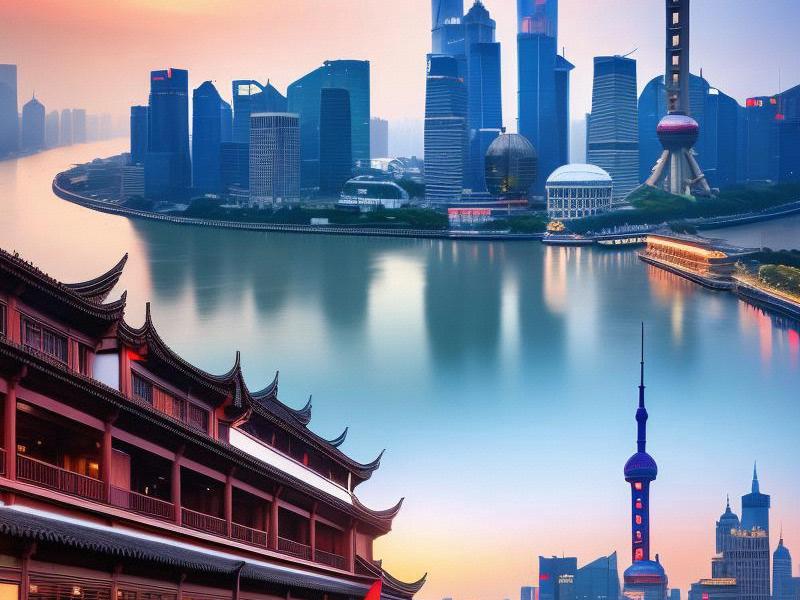
Shanghai, the vibrant city on the banks of the Huangpu River, has long been a symbol of China's economic and cultural prowess. Over the past few decades, Shanghai has undergone a remarkable transformation, evolving from a traditional metropolis into a global innovation hub. This metamorphosis is not just a testament to the city's resilience and adaptability but also a reflection of China's broader aspirations for global leadership in technology, finance, and culture.
The journey of Shanghai began in earnest with the economic reforms initiated in the late 1970s. The opening of the Pudong area in 1990 marked a pivotal moment in this transformation. Once a rural backwater, Pudong has since been transformed into a skyline of glass and steel, home to some of the world's tallest buildings, including the iconic Oriental Pearl Tower and the Shanghai Tower. This rapid urbanization and modernization set the stage for Shanghai's emergence as a global financial center.
The city's economic growth has been nothing short of spectacular. Shanghai is now one of the world's largest financial centers, rivaling even New York and London in terms of market capitalization and trading volumes. The Shanghai Stock Exchange is a key player in global finance, and the city is home to numerous multinational corporations, foreign banks, and international organizations. The establishment of the China (Shanghai) Pilot Free Trade Zone in 2013 further solidified Shanghai's position as a hub for international trade and investment.
However, Shanghai's transformation is not limited to its economic achievements. The city has also made significant strides in preserving and promoting its rich cultural heritage. The Bund, with its historic architecture and stunning views of the Pudong skyline, stands as a living testament to the city's colonial past. Meanwhile, the Yu Garden and the surrounding Old Town area offer a glimpse into the traditional culture and lifestyle of old Shanghai.
上海龙凤419足疗按摩 In recent years, Shanghai has also emerged as a cultural capital, hosting major international events such as the Shanghai International Film Festival, the Shanghai Fashion Week, and the Shanghai World Expo. These events not only showcase the city's cultural vibrancy but also attract millions of visitors from around the world, contributing to its status as a global city.
The technological advancements in Shanghai are equally impressive. The city is at the forefront of China's digital transformation, with a thriving tech ecosystem that includes startups, research institutions, and established technology companies. The Zhangjiang Hi-Tech Park, often referred to as "China's Silicon Valley," is home to numerous high-tech enterprises and research facilities. Shanghai is also a leader in artificial intelligence, big data, and other emerging technologies, with government initiatives aimed at fostering innovation and entrepreneurship.
One of the most striking aspects of Shanghai's transformation is its commitment to sustainability and green development. The city has implemented various measures to reduce pollution, improve air quality, and promote renewable energy. The construction of the Qingcaosha Water Source Facility, one of the largest seawater desalination plants in the world, is a testament to Shanghai's efforts to ensure a sustainable water supply. The city has also invested heavily in public transportation, with the Shanghai Metro system serving as a model for efficient and environmentally friendly urban mobility.
上海龙凤419官网 Education is another area where Shanghai has made significant progress. The city is home to some of the best universities in China, including Fudan University and Tongji University, which are renowned for their academic excellence and research capabilities. Shanghai's education system is designed to foster innovation and critical thinking, preparing the next generation of leaders and innovators.
Despite its rapid development, Shanghai has managed to maintain a sense of community and social cohesion. The city's diverse population, with people from all over China and the world, contributes to its rich cultural tapestry. Community initiatives and social programs ensure that the benefits of economic growth are shared equitably, fostering a sense of belonging and well-being among its residents.
The transformation of Shanghai is not without its challenges. The rapid urbanization has led to issues such as housing shortages, traffic congestion, and environmental concerns. The city government has been proactive in addressing these challenges through innovative policies and sustainable practices. For example, the introduction of shared bicycles and electric vehicles has helped reduce traffic congestion and improve air quality.
爱上海419论坛 Shanghai's transformation is also closely tied to China's broader aspirations for global leadership. As the country's largest city and a key player in the global economy, Shanghai serves as a model for other Chinese cities seeking to achieve similar levels of development. The city's success story is a source of inspiration for many, demonstrating the potential of urbanization and modernization to drive economic growth and improve living standards.
In conclusion, Shanghai's transformation from a traditional metropolis to a global innovation hub is a remarkable achievement that reflects the city's resilience, adaptability, and vision for the future. Through its economic, cultural, and technological advancements, Shanghai has not only preserved its rich heritage but also embraced modernity and innovation. As the city continues to evolve, it remains a beacon of hope and opportunity, showcasing the potential of urbanization and modernization to drive progress and prosperity.
The story of Shanghai is not just about the city itself but also about China's broader aspirations for global leadership. As Shanghai continues to grow and innovate, it serves as a model for other cities around the world, demonstrating the potential of urbanization and modernization to drive economic growth, cultural exchange, and technological advancement. The transformation of Shanghai is a testament to the power of human ingenuity and determination, offering valuable lessons for cities and nations seeking to achieve sustainable development and global competitiveness.
